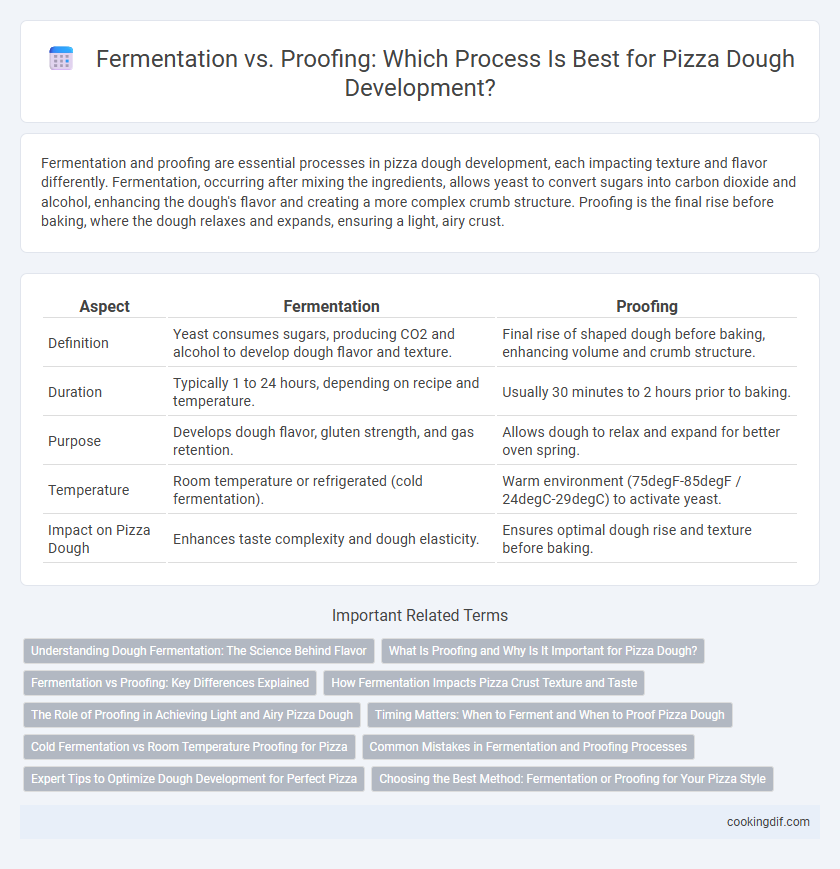Fermentation and proofing are essential processes in pizza dough development, each impacting texture and flavor differently. Fermentation, occurring after mixing the ingredients, allows yeast to convert sugars into carbon dioxide and alcohol, enhancing the dough's flavor and creating a more complex crumb structure. Proofing is the final rise before baking, where the dough relaxes and expands, ensuring a light, airy crust.
Table of Comparison
| Aspect | Fermentation | Proofing |
|---|---|---|
| Definition | Yeast consumes sugars, producing CO2 and alcohol to develop dough flavor and texture. | Final rise of shaped dough before baking, enhancing volume and crumb structure. |
| Duration | Typically 1 to 24 hours, depending on recipe and temperature. | Usually 30 minutes to 2 hours prior to baking. |
| Purpose | Develops dough flavor, gluten strength, and gas retention. | Allows dough to relax and expand for better oven spring. |
| Temperature | Room temperature or refrigerated (cold fermentation). | Warm environment (75degF-85degF / 24degC-29degC) to activate yeast. |
| Impact on Pizza Dough | Enhances taste complexity and dough elasticity. | Ensures optimal dough rise and texture before baking. |
Understanding Dough Fermentation: The Science Behind Flavor
Dough fermentation is a biochemical process where yeast converts sugars into carbon dioxide and alcohol, enhancing flavor complexity through organic acid and ester production. Unlike proofing, which primarily focuses on dough rising, fermentation develops deeper taste profiles and dough texture by allowing extended yeast activity. Controlling fermentation time and temperature is crucial for balancing acidity, aroma, and gluten strength in artisanal pizza dough.
What Is Proofing and Why Is It Important for Pizza Dough?
Proofing is the final rise of pizza dough after shaping, allowing yeast fermentation to produce gas that creates a light, airy texture essential for an ideal crust. This process enhances flavor complexity by developing organic acids and alcohols, contributing to the dough's unique taste profile. Proper proofing ensures optimal gluten structure, resulting in a chewy yet tender pizza base prized in authentic Italian-style pizzas.
Fermentation vs Proofing: Key Differences Explained
Fermentation involves yeast converting sugars into carbon dioxide and alcohol, which develops flavor and texture in pizza dough over time. Proofing is the final rise after shaping the dough, allowing it to expand and become airy before baking. Understanding these key differences ensures optimal dough development and a perfectly balanced pizza crust.
How Fermentation Impacts Pizza Crust Texture and Taste
Fermentation significantly enhances pizza crust texture by allowing yeast to produce carbon dioxide, which creates air pockets that result in a light and airy crumb. During fermentation, organic acids and alcohols develop, contributing complex flavors and a slight tanginess essential to artisan-style pizza. Proper fermentation time improves dough extensibility and oven spring, yielding a crust with optimal chewiness and a rich, nuanced taste profile.
The Role of Proofing in Achieving Light and Airy Pizza Dough
Proofing plays a crucial role in developing light and airy pizza dough by allowing yeast to produce carbon dioxide, which creates bubbles and expands the dough's structure. This process softens the gluten network, enhancing dough elasticity and resulting in a tender crumb with an open texture. Unlike fermentation, proofing is specifically the final rise that directly impacts dough volume and the airy quality essential for an ideal pizza crust.
Timing Matters: When to Ferment and When to Proof Pizza Dough
Fermentation allows yeast to develop flavor and texture in pizza dough over several hours or days at controlled temperatures, while proofing is the final rise that occurs just before baking, typically lasting 30 minutes to 2 hours. Timing is crucial as under-fermented dough lacks depth of flavor and proper gluten structure, whereas under-proofed dough results in dense, less airy crust. Optimal pizza dough development balances extended fermentation for complex taste with precise proofing to ensure light, bubbly texture.
Cold Fermentation vs Room Temperature Proofing for Pizza
Cold fermentation enhances pizza dough flavor and texture by slowly developing gluten and complex organic acids over 24 to 72 hours at temperatures between 2degC and 5degC, resulting in a chewier crust and richer taste. In contrast, room temperature proofing accelerates yeast activity, typically taking 1 to 3 hours at around 20degC to 25degC, producing a quicker rise but less depth in flavor and a softer crust. Cold fermentation is preferred by artisan pizzerias seeking extended fermentation benefits, while room temperature proofing suits fast-paced environments prioritizing time efficiency.
Common Mistakes in Fermentation and Proofing Processes
Common mistakes in pizza dough fermentation include insufficient temperature control, leading to underdeveloped gluten and poor flavor complexity, and over-fermentation, which causes dough collapse and sour off-flavors. In proofing, errors often involve improper humidity levels that dry out the dough surface, resulting in a tough crust, or inadequate proofing time that yields dense and chewy pizza bases. Mastering optimal yeast activity, temperature, and timing ensures balanced dough structure and enhanced pizza quality.
Expert Tips to Optimize Dough Development for Perfect Pizza
Fermentation involves allowing yeast in pizza dough to consume sugars, producing carbon dioxide and enhancing flavor complexity over several hours or days. Proofing is the final rise of shaped dough before baking, focusing on achieving optimal gas retention and dough elasticity to ensure a light, airy crust. Expert tips include controlling fermentation temperature between 18-24degC for balanced flavor, extending cold fermentation up to 72 hours for deeper taste, and proofing dough at 26-28degC for 45-60 minutes to optimize oven spring and texture.
Choosing the Best Method: Fermentation or Proofing for Your Pizza Style
Fermentation develops complex flavors and improves dough texture by allowing yeast to metabolize sugars over an extended period, ideal for Neapolitan and artisan-style pizzas. Proofing is a shorter rising process that primarily increases dough volume, suitable for quicker pizza styles requiring a lighter, airier crust like New York-style. Selecting the best method depends on desired crust characteristics, with fermentation enhancing flavor depth and proofing offering speed and softness.
Fermentation vs proofing for dough development Infographic

 cookingdif.com
cookingdif.com